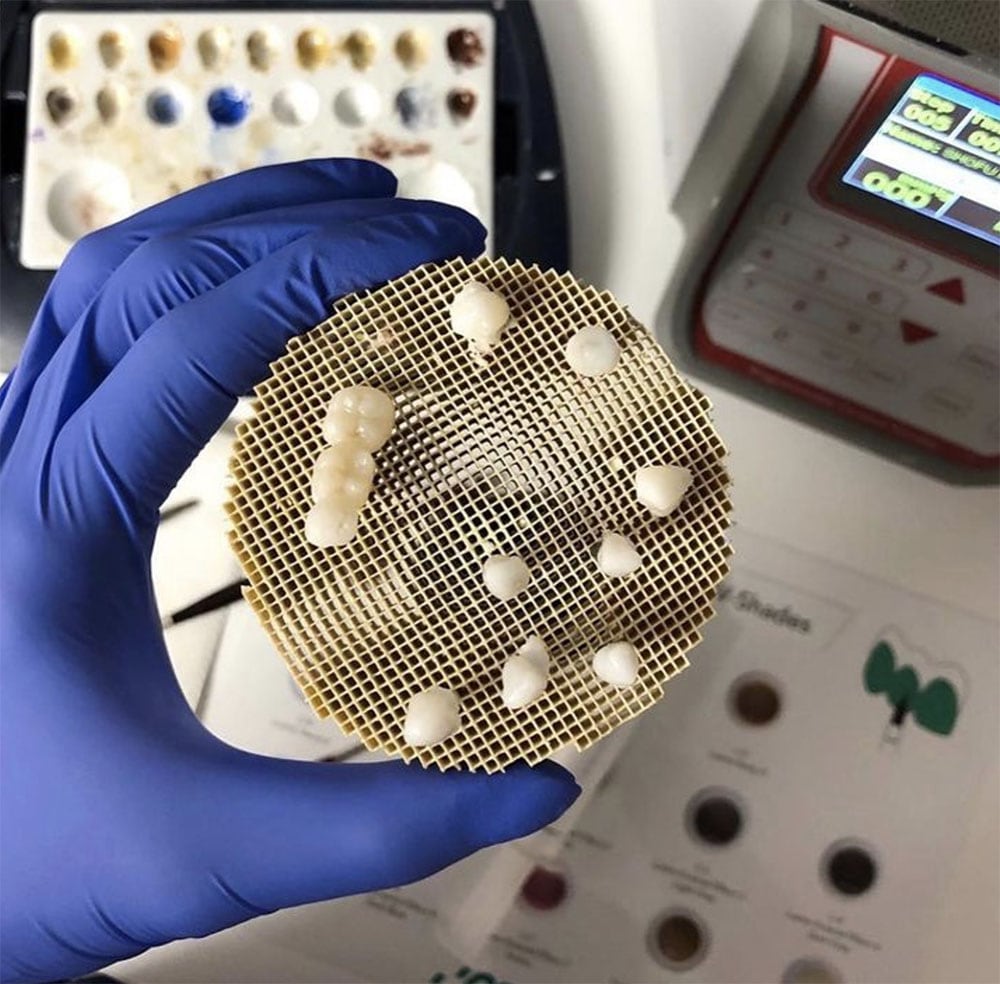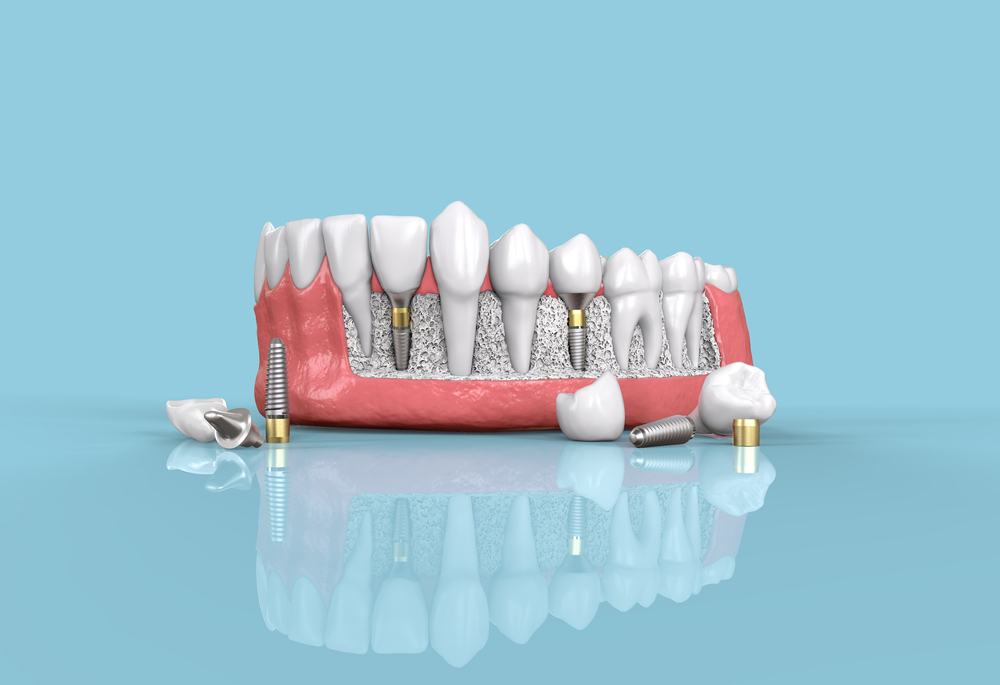Dental Crowns
Durable, versatile dental crowns are an extremely popular example of restorative dentistry. Acting as a protective “cap” for decayed or damaged teeth, crowns are able to mask a variety of aesthetic dental concerns while simultaneously restoring function to the bite. Our leading cosmetic dentist, Rafael Yanez, DMD, custom-designs dental crowns according to the specific oral care needs of each patient. As a result, patients regularly delight in the beautiful, long-lasting effects of our top-of-the-line dental crowns.

What Are Dental Crowns?
A dental crown is placed over a tooth’s enamel (outermost layer) in order to improve its strength—which, in turn, can improve the strength of the teeth surrounding it. Crafted from porcelain or other materials, crowns are also used to improve the aesthetic appearance of the tooth. They can be incorporated into several restorative and cosmetic treatments; for instance, they are placed on top of dental implants to emulate natural teeth. In addition, they are an integral part of the dental bridges procedure, in which they are used to cover multiple teeth at a time and secure the bridge in place.
While crowns can be made of a number of sturdy materials, we use a top-quality porcelain to craft dental crowns at our practice. Porcelain is often considered the choice material for dental crowns, due to its durability and beautiful, natural shine.

What Are the Benefits of Dental Crowns?
When dental crowns are placed by an experienced cosmetic dentist, they can:
- Restore a decayed, broken, cracked, or chipped tooth to optimal function
- Protect a vulnerable tooth from further damage
- Complete restorations such as bridges or implants
- Be incorporated into cosmetic procedures (e.g., a smile makeover) to bring out the beauty of the smile
- Seamlessly match the natural shape and shade of your teeth
- Conceal cosmetic imperfections, including misalignment, discoloration, and much more
What Does the Dental Crown Procedure Involve?
Generally speaking, the dental crown procedure is quite straightforward. As a first step, Dr. Yanez will take an impression of the affected tooth or teeth. He can then use the impression to create a supremely natural-looking restoration in our on-site dental lab. Because our dental lab includes some of the most advanced technology on the market, and because it is located on our premises, our crowns can be finished and placed very quickly. In fact, depending on the extent of treatment and the number of crowns you need, the entire procedure can often be completed in a single visit. In other cases (such as in a dental implant procedure), you may be given a temporary crown to wear while your restoration is being built.
When the time comes to place your crown, Dr. Yanez will numb the area around the tooth. Depending on the condition and location of the tooth, he may remove some of the tooth’s matter to make way for the crown. This part of the procedure is typically finished within an hour, and most patients experience little to no discomfort.
How Long Do Dental Crowns Last?
While dental crowns are designed to be permanent, patients usually need to replace them within approximately 10 years. In our experience, dental crowns tend to last longer in patients who practice excellent oral hygiene. Moreover, it is important to brush at least twice a day, floss regularly, and maintain a healthy diet in order to reap the full benefits of your dental crowns.
Is It Painful to Get a Dental Crown?
Our dentist places your safety and comfort higher on our list of priorities than anything else. Dental crown procedures should not cause excessive amounts of pain since the area is numbed with a strong local anesthetic. After treatment, the area where the crown was placed will likely be a bit tender and sensitive; however, these effects should subside within a couple of days.
Dental Crowns vs. Veneers
While dental crowns and porcelain veneers are both effective options for treating aesthetic concerns and structurally compromised teeth, they are distinct from one another in several ways. Dental crowns cover the entire visible portion of the teeth. They are primarily categorized as a restorative dental treatment capable of enhancing the health, function, and appearance of the teeth. Porcelain veneers cover only the front and side areas of the teeth and are more of a cosmetic dental treatment option. Veneers do offer restorative benefits, as well; however, they will likely not be the recommended option for teeth that are suffering from severe decay or damage that could result in further deterioration or infection. Both treatments can provide tremendous advantages, both cosmetically and restoratively, and Dr. Yanez will recommend the most ideal option based on your individual needs.
Are There Alternatives to Dental Crowns?
Some patients may not require a full dental crown to successfully address their needs and goals. An alternative to dental crowns such as porcelain veneers may be all that is necessary to produce the ideal solution. While dental crowns are often included as part of a smile makeover or a full mouth reconstruction, some individuals may not even require them for those procedures, depending on their needs. Dr. Yanez can discuss potential alternatives to dental crowns during your initial consultation and determine whether another option is appropriate.
How Do I Care for My Dental Crown?
No additional maintenance other than brushing and flossing is typically necessary with dental crowns. With that in mind, it is important to take some extra precautions. We advise patients to avoid using the crowns to bite down on hard, crunchy, or sticky foods in order to decrease the chance of accidentally breaking the crown or causing it to become loose. Keeping up with dental checkups and cleanings will also assist with prolonging the life of your crowns and making it possible for them to last decades into the future.
How Much Do Dental Crowns Cost?
The cost of your dental crown(s) will depend on a number of factors, including:
- The number of crowns you need
- The extent of treatment
- The type of materials used
- The total cost of the procedure (if the crown is part of another restoration)
Please note that while some insurance plans will cover dental crowns, most will only do so if the crown is part of a restorative procedure (e.g., implants, bridges, etc.). That said, Dr. Yanez and the rest of our team are happy to communicate with you regarding the price of your procedure during your initial consultation. In the meantime, we encourage you to review our list of participating insurance groups and explore our dental financing options, which include three of the most trusted third-party lenders. No matter the treatment in question, we aim to make the payment process as stress-free as possible for each patient.
To learn more about dental crowns, or to schedule a complimentary consultation, please contact our office.

“I.Dentical is about as good as it gets for the dentist. The environment is wonderful, all staff are friendly and helpful, and the doctors and technicians do a great job by providing thoughtful care. The responsiveness is top notch – Dr. Yanez once drove into the office on a Saturday morning when they were not open to refit a crown that had fallen out the night before. I highly recommend I.Dentical if you’re looking for a dentist in Philadelphia. ”


